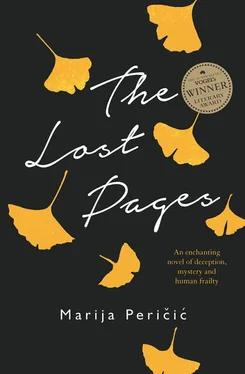I took the little box from my pocket, the comb still inside, and dropped it into the dark river. I felt no emotion. I did not even hear it hit the surface. I found the ginkgo leaf in my trouser pocket and dropped it in too. It fell to the water in a series of swoops like broken sobs, then it sailed away down the river, a little yellow boat on a sea of black.
FOR SOME DAYS AFTER THIS I STAYED IN MY ROOM, SUFFERING with a fever that made a truth of the illness I had feigned at the post office. I drifted in and out of sleep, slipping between the world of the familiar room, and Elsa and Sophie, and another world of a continuous dream that was just as real as the world of my bedroom.
In the dream I was running after Anja and Franz was running after me across the whole city. My body was as heavy as a lump of stone and wouldn’t obey me. I strained to catch up with Anja, who was reduced to the hem of a skirt or a sweep of hair that was always just disappearing around a corner, out of reach. My chest burned with exertion and I let out mute cries, and the terror that I would lose sight of her was the terror of death. Meanwhile, Franz pursued me with a giant’s strides, brandishing a sheaf of papers like a club. I would wake gasping from these dreams, my sweat chilling my skin.
When I was awake the anxiety about my writing and Franz returned and competed with the anxiety I felt about Anja’s rejection. After some days, when I had recovered slightly, I began to write her letters, but I did not know what tone to take, who to be in the letter. Letter after letter I wrote and then discarded, throwing them into the fire when my wastepaper basket had overflowed.
I lay in bed and analysed her behaviour, every look, every word, every gesture that I could remember, in a futile round that always ended with everything slipping away from me. The only conclusion I could reach was that I was uncertain as to what was between us and what might be between her and Franz.
Postcards and letters began to arrive for me: from Kröner at the post office, from Felix and Kurt, and of course several from Uta. I received none from Anja.
Uta’s were the first to arrive: she must have heard from Sophie about my illness. They were written, of course, on pastel-shaded, scented paper, Uta’s looping hand scrawling inferior epigrams and clichéd wishes across the page. I opened the first one by accident and was overcome with nausea as the perfume with which the paper was infused reached my nostrils. Uta also visited several times and my ears were constantly on alert for her shrill voice raised in greeting at the front door. As soon as I heard it I feigned sleep, so that when Sophie brought her to my bedroom the door only opened a small way and then quietly closed again. I would lie motionless until I heard their whispered voices recede down the hallway.
A postcard also came from Theodor, ostensibly to wish me well in my illness but really to remind me of my looming deadline. It seemed that he was not as much in my debt from my procurement of ‘Franz’ as I’d hoped. To give myself the courage to examine my shambolic notes, I took out a copy of my novel and leafed through the pages. But the printed words I saw there were so foreign to me that I felt my eyebrows travel up my forehead in surprise at my own cleverness. I could not recognise myself in the words I read.
Perhaps, I thought, the problem was that it was written too long ago. I went through my papers to find something more recent, but after some searching I realised that there was nothing, apart from the few scratchings of notes that I was steeling myself to read. Then I remembered the story that I had written a few months before when I had fallen asleep at my writing table. I searched through my desk without finding it, before remembering that I had taken it to work with me. But when I looked in my briefcase it was not to be found there either. I must have left it in my office.
My desk and the floor around it was now littered with papers and books. My eyes fell on Franz’s manuscript. The weight of all of that paper, the thought of his hand making all those minute motions of the pen across the page, dismayed me. I felt drawn to read it, compelled by a sick desire to measure myself against him. I took the manuscript back to bed with me and looked for the first time at the title page: Die Verwandlung . [11] The Metamorphosis
I disregarded the pages with plans that preceded the text and began to read.
Even the first lines caused the skin over my skull and the back of my neck to contract with horror. When I read the description of Gregor, the vermin, getting out of the bed, his body monstrous and uncontrollable, I had the impression that I was reading a story about myself. It was like looking in a mirror. Gregor’s experience on that first morning is my own on every morning of my life. In the realm of sleep I am not hampered by palsied limbs and misshapen bones. There, I glide through the world without obstacles. Waking every day is waking to a cage that must be carried around at all times, without exception.
When I was five years old my childhood ended. My body had grown enough to reveal the broken form that it would take and my poor foot trailed behind me as I walked. I listed like a ship, as I had not yet learned how to negotiate the distribution of my weight. My mother took me to the house of a healer she had heard of—a shoemaker and man of miracles who lived in the forest to the south. It was winter, and a long journey, first by a series of trains and then the final part by carriage over the icy roads. I remember pressing my face against the cold sheet of the carriage window and seeing the forest advancing darkly upon us like a storm cloud.
I did not really know where we were going, only that we were going to make me better, make me like the other boys. As a child I was desperate to please my mother. I was aware that somehow I was always disappointing her but I did not know the reason for it. I strained for her affection, hungered to make her proud of me. But whenever she looked at me there was always in her eyes a wall of sadness, a regret that she would quickly hide behind some other emotion. No matter how well behaved I was or how many things I learned, this look was always hovering close by, ready to emerge at an unguarded moment.
The shoemaker’s house was far from the nearest village, on the very edge of the forest. It was a small cottage, cosy and neat, with smoke drifting from the chimney, but behind it a dense wall of trees surged up like a black wave about to engulf it. There was a little kitchen garden, covered in snow, which was surrounded by a wooden fence. Beside the front door was a kind of trellis, and when we came closer I saw that upon it hung a range of rusted tools. My eyes fell on the blades of all kinds of jagged saws and monstrous scissors and metal implements that I could not name. At the sight of these I began to cry and pull on my mother’s hand, refusing to go any closer. I had visions of the man hanging me up somewhere and slicing pieces of flesh from my side with the rusty tools, the way a butcher slices sides of meat from a hanging carcass.
The interior of the shoemaker’s house was filled with an even greater range of nightmarish tools and machines. Of the man himself I had seen only his large and muddy boots, which sprouted from the ground like huge brown mushrooms. I was too afraid to raise my eyes, so the current of his conversation with my mother took place over my head, against the background of my jagged inhalations and snuffling breaths. Eventually, the man crouched down before me and raised my head with his hand under my chin. His hand was rough and hard but I was surprised at the kindness of his eyes. He looked at me for a moment and smiled, and then straight away got down to the business of measuring me. He stood me on a raised block, like a little pedestal in the middle of the room, and I swayed unsteadily there, crying for my mother. He produced a series of callipers and measuring tapes. I had never seen callipers before and I imagined them to be some kind of device for torture that would compress parts of me in their jaws. I could see them crunching down on my bones. I screamed and cried when he approached and my mother came to my side and held my hand, stroking the back of it and speaking to me in a low monotone to soothe me. She told me that the man was only measuring me and not to be afraid, and that it was just like being measured by the tailor for my clothes. Measuring took a long time, and the man laboriously wrote the numbers on a scrap of paper.
Читать дальше












